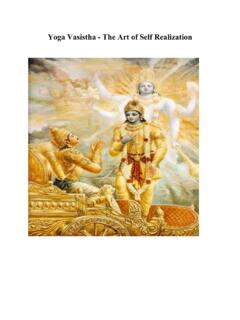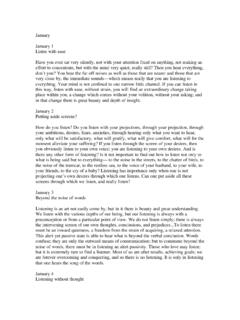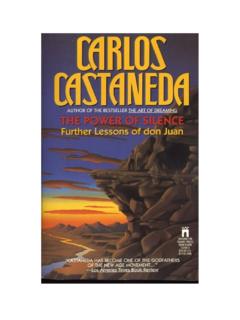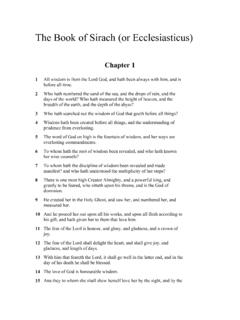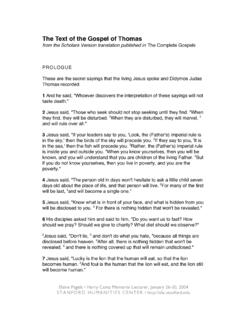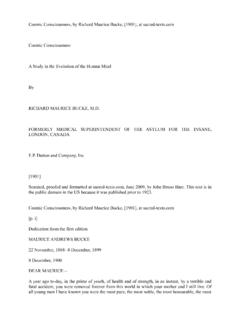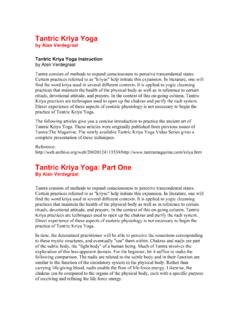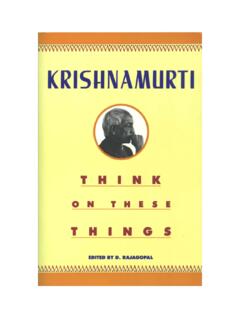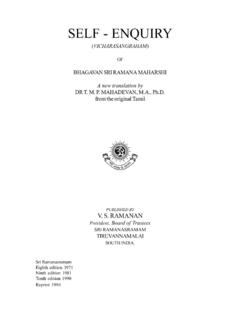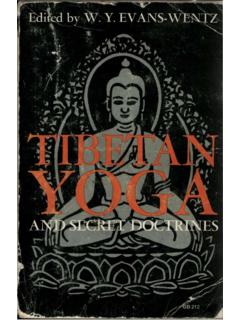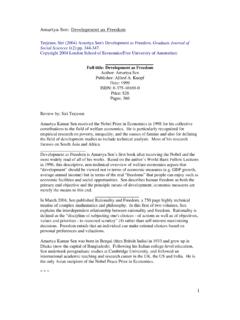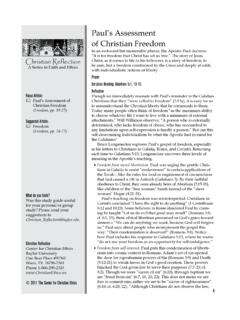Transcription of The First And Last Freedom - SelfDefinition.Org
1 The First And Last FreedomTHE First AND LAST FREEDOMCHAPTER1 FOREWORD BY ALDOUS HUXLEYMAN IS AN amphibian who lives simultaneously in two worlds - the given and the homemade, theworld of matter, life and consciousness and the world of symbols. In our thinking we make use ofa great variety of symbol-systems - linguistic, mathematical, pictorial, musical, ritualistic. Withoutsuch symbol-systems we should have no art, no science, no law, no philosophy, not so much as therudiments of civilization: in other words, we should be , then, are indispensable. But symbols - as the history of our own and every other agemakes so abundantly clear - can also be fatal. Consider, for example, the domain of science onthe one hand, the domain of politics and religion on the other. Thinking in terms of, and actingin response to, one set of symbols, we have come, in some small measure, to understand andcontrol the elementary forces of nature.
2 Thinking in terms of and acting in response to, anotherset of symbols, we use these forces as instruments of mass murder and collective suicide. In thefirst case the explanatory symbols were well chosen, carefully analysed and progressively adaptedto the emergent facts of physical existence. in the second case symbols originally ill-chosen werenever subjected to thoroughgoing analysis and never re-formulated so as to harmonize with theemergent facts of human existence. Worse still, these misleading symbols were everywhere treatedwith a wholly unwarranted respect, as though, in some mysterious way, they were more real thanthe realities to which they referred. In the contexts of religion and politics, words are not regarded asstanding, rather inadequately, for things and events; on the contrary, things and events are regardedas particular illustrations of words.
3 Up to the present symbols have been used realistically onlyin those fields which we do not feel to be supremely important. In every situation involving ourdeeper impulses we have insisted on using symbols, not merely unrealistically, but idolatrously, eveninsanely. The result is that we have been able to commit, in cold blood and over long periods of time,acts of which the brutes are capable only for brief moments and at the frantic height of rage, desireor fear. Because they use and worship symbols, men can become idealists; and, being idealists,2 CHAPTER 1. FOREWORD BY ALDOUS HUXLEY they can transform the animal s intermittent greed into the grandiose imperialisms of a Rhodes or aJ. P. Morgan; the animal s intermittent love of bullying into Stalinism or the Spanish Inquisition; theanimal s intermittent attachment to its territory into the calculated frenzies of nationalism.
4 Happily,they can also transform the animal s intermittent kindliness into the lifelong charity of an Elizabeth Fryor a Vincent de Paul; the animal s intermittent devotion to its mate and its young into that reasonedand persistent co-operation which, up to the present, has proved strong enough to save the worldfrom the consequences of the other, the disastrous kind of idealism. Will it go on being able tosave the world ? The question cannot be answered. All we can say is that, with the idealists ofnationalism holding the A-bomb, the odds in favour of the idealists of co-operation and charity havesharply the best cookery book is no substitute for even the worst dinner. The fact seems sufficientlyobvious. And yet, throughout the ages, the most profound philosophers, the most learned and acutetheologians have constantly fallen into the error of identifying their purely verbal constructions withfacts, or into the yet more enormous error of imagining that symbols are somehow more real thanwhat they stand for.
5 Their word-worship did not go without protest. Only the spirit, said St. Paul, gives life; the letter kills. And why, asks Eckhart, why do you prate of God? Whatever you sayof God is untrue. At the other end of the world the author of one of the Mahayana sutras affirmedthat the truth was never preached by the Buddha, seeing that you have to realize it within yourself .Such utterances were felt to be profoundly subversive, and respectable people ignored them. Thestrange idolatrous over-estimation of words and emblems continued unchecked. Religions declined;but the old habit of formulating creeds and imposing belief in dogmas persisted even among recent years logicians and semanticists have carried out a very thorough analysis of the symbols,in terms of which men do their thinking. Linguistics has become a science, and one may even studya subject to which the late Benjamin Whorf gave the name of meta-linguistics.
6 All this is greatlyto the good; but it is not enough. Logic and semantics, linguistics and meta-linguistics - these arepurely intellectual disciplines. They analyse the various ways, correct and incorrect, meaningfuland meaningless, in which words can be related to things, processes and events. But they offerno guidance, in regard to the much more fundamental problem of the relationship of man in hispsychophysical totality, on the one hand, and his two worlds, of data and of symbols, on the every region and at every period of history, the problem has been repeatedly solved by individualmen and women. Even when they spoke or wrote, these individuals created no systems - for theyknew that every system is a standing temptation to take symbols too seriously, to pay more attentionto words than to the realities for which the words are supposed to stand.
7 Their aim was never tooffer ready-made explanations and panaceas; it was to induce people to diagnose and cure theirown ills, to get them to go to the place where man s problem and its solution present themselvesdirectly to this volume of selections from the writings and recorded talks of Krishnamurti, the reader will finda clear contemporary statement of the fundamental human problem, together with an invitation tosolve it in the only way in which it can be solved - for and by himself. The collective solutions, towhich so many so desperately pin their faith, are never adequate. To understand the misery andconfusion that exist within ourselves, and so in the world , we must First find clarity within ourselves,and that clarity comes about through right thinking. This clarity is not to be organized, for it cannotThe First And Last Freedom3 Jiddu KrishnamurtiCHAPTER 1.
8 FOREWORD BY ALDOUS HUXLEYbe exchanged with another. Organized group thought is merely repetitive. Clarity is not the result ofverbal assertion, but of intense self-awareness and right thinking. Right thinking is not the outcomeof or mere cultivation of the intellect, nor is it conformity to pattern, however worthy and noble. Rightthinking comes with self-knowledge. Without understanding yourself you have no basis for thought;without self-knowledge, what you think is not true. This fundamental theme is developed by Krishnamurti in passage after passage. There is hope inmen, not in society, not in systems, organized religious systems, but in you and in me. Organizedreligions, with their mediators, their sacred books, their dogmas, their hierarchies and rituals, offeronly a false solution to the basic problem. When you quote the Bhagavad Gita, or the Bible, or someChinese Sacred Book, surely you are merely repeating, are you not?
9 And what you are repeatingis not the truth. It is a lie, for truth cannot be repeated. A lie can be extended, propounded andrepeated, but not truth; and when you repeat truth, it ceases to be truth, and therefore sacred booksare unimportant. It is through self-knowledge, not through belief in somebody else s symbols, that aman comes to the eternal reality, in which his being is grounded. Belief in the complete adequacyand superlative value of any given symbol system leads not to liberation, but to history, to more ofthe same old disasters. Belief inevitably separates. If you have a belief, or when you seek securityin your particular belief, you become separated from those who seek security in some other formof belief. All organized beliefs are based on separation, though they may preach brotherhood. The man who has successfully solved the problem of his relations with the two worlds of data andsymbols, is a man who has no beliefs.
10 With regard to the problems of practical life he entertainsa series of working hypotheses, which serve his purposes, but are taken no more seriously thanany other kind of tool or instrument. With regard to his fellow beings and to the reality in whichthey are grounded, he has the direct experiences of love and insight. It is to protect himself frombeliefs that Krishnamurti has not read any sacred literature, neither the Bhagavad Gita nor theUpanishads . The rest of us do not even read sacred literature; we read our favourite newspapers,magazines and detective stories. This means that we approach the crisis of our times, not with loveand insight, but with formulas, with systems - and pretty poor formulas and systems at that. But men of good will should not have formulas; for formulas lead, inevitably, only to blind thinking.
